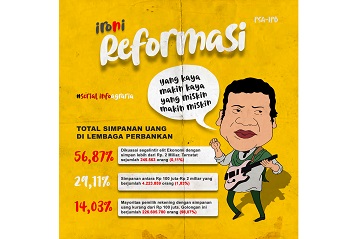IPB Agrarian Study Center Raised the Issue of the Coverage of the HGU

On 20th February 2019, the public was faced with a trial due to the failure to fulfill the request for information by a public agency. This time, it was the turn of Greenpeace Indonesia to face the Ministry of Agrarian Affairs and Spatial Planning / National Land Agency (ATR / BPN) in the case of a dispute over information on HGU (Hak Guna Usaha) document. This case adds to the row of cases of the closure of the ATR / BPN in the public interest.
Information on palm oil HGU is still considered to be closed or confidential by the ATR / BPN Ministry. Creating unfair business competition, opening company secrets is the reason that this public agency always presents.
“There is no reason for the Public Agency to close (information) HGU. Article 11 paragraph 1 of the Public Information Disclosure Act (KIP) has confirmed that the HGU as a product of public policy is open and must be provided at all times. Even some Court and Supreme Court Decisions have also become jurisprudence for open palm oil HGU documents,” said Linda Rosalina, researcher in Agrarian Policy and Politics at the Center for Agrarian Studies, Institute for Research and Community Service of IPB (PSA LPPM IPB).
In line with this, the Head of the PSA’s Ecology, Population and Agrarian Dynamics Program, LPPM IPB, M. Shohibuddin also regretted the neglect of the ATR / BPN Ministry. Shohibuddin stated that this attitude was a cover-up and at the same time increasingly confirmed structural inequality in the homeland which ironically sharpened precisely in the reform era. The process of democratization after the authoritarianism of the Soeharto regime actually led to a sharpening of economic inequality. This structure of economic inequality is actually in line with the structure of the inequality of control of national agrarian assets.
The head of the National Land Agency for the period 2005-2012 once suggested that 56 percent of national assets in the form of land (mostly in the form of plantation concessions) were controlled by only about 0.2 percent of Indonesia’s population. This agrarian inequality figure is almost identical to the proportion of money savings held in the LPS (Customer Guarantee Agency) data as of October 2017, namely: 56.87 percent of total money deposits in banking institutions controlled by only 0.11 percent of account holders above 2 billion IDR. “This condition shows that the accumulation of wealth in a handful of economic elites is mostly obtained from the natural resources sector through the control of agrarian resources and the natural wealth they contain,” said Shohibuddin.
PSA-IPB emphasizes the government must show its seriousness in dealing with economic inequality and also inequality in the control of agrarian assets. Information disclosure must be done as an entry point for public effectiveness to help the government oversee the development of Agrarian Sources (SSA). The urgency of openness of HGU and information on the mastery of the SSA should be able to surpass 2019 political interests. (RYS)



